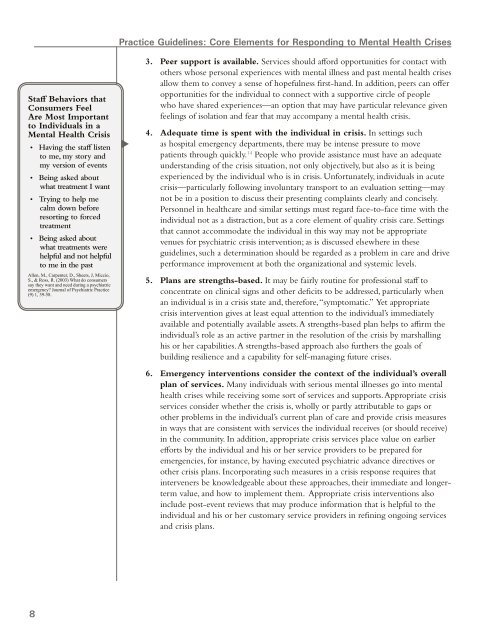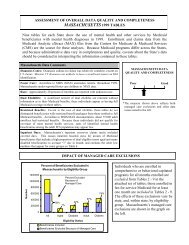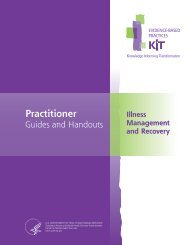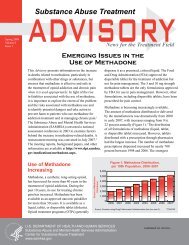Practice Guidelines: Core Elements for Responding to Mental Health
Practice Guidelines: Core Elements for Responding to Mental Health
Practice Guidelines: Core Elements for Responding to Mental Health
You also want an ePaper? Increase the reach of your titles
YUMPU automatically turns print PDFs into web optimized ePapers that Google loves.
<strong>Practice</strong> <strong>Guidelines</strong>: <strong>Core</strong> <strong>Elements</strong> <strong>for</strong> <strong>Responding</strong> <strong>to</strong> <strong>Mental</strong> <strong>Health</strong> Crises<br />
staff behaviors that<br />
consumers feel<br />
Are most important<br />
<strong>to</strong> individuals in a<br />
mental health crisis<br />
• Having the staff listen<br />
<strong>to</strong> me, my s<strong>to</strong>ry and<br />
my version of events<br />
• Being asked about<br />
what treatment I want<br />
• Trying <strong>to</strong> help me<br />
calm down be<strong>for</strong>e<br />
resorting <strong>to</strong> <strong>for</strong>ced<br />
treatment<br />
• Being asked about<br />
what treatments were<br />
helpful and not helpful<br />
<strong>to</strong> me in the past<br />
Allen, M., Carpenter, D., Sheets, J, Miccio,<br />
S., & Ross, R. (2003) What do consumers<br />
say they want and need during a psychiatric<br />
emergency? Journal of Psychiatric <strong>Practice</strong><br />
(9) 1, 39-58.<br />
t<br />
3. Peer support is available. Services should af<strong>for</strong>d opportunities <strong>for</strong> contact with<br />
others whose personal experiences with mental illness and past mental health crises<br />
allow them <strong>to</strong> convey a sense of hopefulness first-hand. In addition, peers can offer<br />
opportunities <strong>for</strong> the individual <strong>to</strong> connect with a supportive circle of people<br />
who have shared experiences—an option that may have particular relevance given<br />
feelings of isolation and fear that may accompany a mental health crisis.<br />
4. Adequate time is spent with the individual in crisis. In settings such<br />
as hospital emergency departments, there may be intense pressure <strong>to</strong> move<br />
patients through quickly. 14 People who provide assistance must have an adequate<br />
understanding of the crisis situation, not only objectively, but also as it is being<br />
experienced by the individual who is in crisis. Un<strong>for</strong>tunately, individuals in acute<br />
crisis—particularly following involuntary transport <strong>to</strong> an evaluation setting—may<br />
not be in a position <strong>to</strong> discuss their presenting complaints clearly and concisely.<br />
Personnel in healthcare and similar settings must regard face-<strong>to</strong>-face time with the<br />
individual not as a distraction, but as a core element of quality crisis care. Settings<br />
that cannot accommodate the individual in this way may not be appropriate<br />
venues <strong>for</strong> psychiatric crisis intervention; as is discussed elsewhere in these<br />
guidelines, such a determination should be regarded as a problem in care and drive<br />
per<strong>for</strong>mance improvement at both the organizational and systemic levels.<br />
5. Plans are strengths-based. It may be fairly routine <strong>for</strong> professional staff <strong>to</strong><br />
concentrate on clinical signs and other deficits <strong>to</strong> be addressed, particularly when<br />
an individual is in a crisis state and, there<strong>for</strong>e,“symp<strong>to</strong>matic.” Yet appropriate<br />
crisis intervention gives at least equal attention <strong>to</strong> the individual’s immediately<br />
available and potentially available assets.A strengths-based plan helps <strong>to</strong> affrm the<br />
individual’s role as an active partner in the resolution of the crisis by marshalling<br />
his or her capabilities.A strengths-based approach also furthers the goals of<br />
building resilience and a capability <strong>for</strong> self-managing future crises.<br />
6. emergency interventions consider the context of the individual’s overall<br />
plan of services. Many individuals with serious mental illnesses go in<strong>to</strong> mental<br />
health crises while receiving some sort of services and supports.Appropriate crisis<br />
services consider whether the crisis is, wholly or partly attributable <strong>to</strong> gaps or<br />
other problems in the individual’s current plan of care and provide crisis measures<br />
in ways that are consistent with services the individual receives (or should receive)<br />
in the community. In addition, appropriate crisis services place value on earlier<br />
ef<strong>for</strong>ts by the individual and his or her service providers <strong>to</strong> be prepared <strong>for</strong><br />
emergencies, <strong>for</strong> instance, by having executed psychiatric advance directives or<br />
other crisis plans. Incorporating such measures in a crisis response requires that<br />
interveners be knowledgeable about these approaches, their immediate and longerterm<br />
value, and how <strong>to</strong> implement them. Appropriate crisis interventions also<br />
include post-event reviews that may produce in<strong>for</strong>mation that is helpful <strong>to</strong> the<br />
individual and his or her cus<strong>to</strong>mary service providers in refining ongoing services<br />
and crisis plans.<br />
8

















